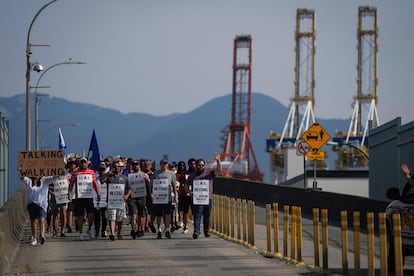Canadian ports brought to a standstill after 7,400 workers go on strike
Trade has been hit hard by the industrial action in British Colombia, while talks remain deadlocked


Since Saturday, some 7,400 workers — mostly dockworkers — have been on strike in more than 30 ports in the Canadian province of British Columbia. The strike has taken a particularly heavy toll on the port terminals of Vancouver and Prince Rupert, the first and third-most important in Canada. Negotiations are at a standstill and, with trade being hit hard, there are growing calls for a special law to end the conflict.
The workers’ collective contract expired on March 31, and the strikers are now asking for a wage rise in line with inflation. The sector also wants greater protection against automation and subcontracting in the sector.
Union leadership “has not taken this decision lightly, but for the future of our workforce we had to take this step,” said Rob Ashton, the president of the Canadian chapter of the International Longshoremen’s and Warehousemen’s Union (ILWU), at a news conference on Sunday. “For the last 30 years, we’ve had labor peace in this province. It’s been almost 30 years since our union has been on strike,” he added.
At a solidarity rally on Thursday, Ashton said that the employer had walked away from the negotiating table three times. “They’re trying to wait for the government to do their dirty work because they don’t want to treat us with respect,” he said. For its part, the British Columbia Maritime Employers Association said that binding arbitration could bring the dispute to an end.
Negotiations between the union and the employer — which are mediated by the federal government — have been difficult. After making some progress, talks have been deadlocked over maintenance. Both sides have accused the other of negotiating in bad faith.
According to the Canadian Chamber of Commerce, more than C$800 million ($604 million) worth of goods make their way through the B.C. ports each day, accounting for about a quarter of Canada’s total traded goods flow. Cruise ships have not been affected by the strike; neither have the movement of grain vessels, as established by the Canadian Labor Code.
On April 26, 2021, more than 1,000 workers at the port of Montreal (the second largest in the country) went on strike. Four days later, the Canadian Parliament passed a special law that forced the striking workers back to work. Various associations and provincial governments are calling on federal legislators to implement the strategy in British Columbia.
The provincial government of Alberta — which depends on these ports for trade — has called on the central government to protect supply chains. While the Canadian Federation of Independent Business (CFIB) said in a statement that “the government must quickly put in place legislation to ensure that port activities are fully maintained even in the event of a strike.”
Canada’s Minister of Labor, Seamus O’Regan, said that the best solution is for the union and employers to resume negotiations and talk until they reach an agreement. Parliament closed on June 21 and will not resume until September 18, according to the official calendar. However, the Canadian government, which is led by Prime Minister Justin Trudeau, can call an extraordinary session if it needs to vote on special legislation to end the strike. Trudeau’s Liberal Party governs in a minority, meaning it would need the support of the Conservative Party of Canada, Bloc Québécois or the New Democratic Party to pass the proposal.
Sign up for our weekly newsletter to get more English-language news coverage from EL PAÍS USA Edition
Tu suscripción se está usando en otro dispositivo
¿Quieres añadir otro usuario a tu suscripción?
Si continúas leyendo en este dispositivo, no se podrá leer en el otro.
FlechaTu suscripción se está usando en otro dispositivo y solo puedes acceder a EL PAÍS desde un dispositivo a la vez.
Si quieres compartir tu cuenta, cambia tu suscripción a la modalidad Premium, así podrás añadir otro usuario. Cada uno accederá con su propia cuenta de email, lo que os permitirá personalizar vuestra experiencia en EL PAÍS.
¿Tienes una suscripción de empresa? Accede aquí para contratar más cuentas.
En el caso de no saber quién está usando tu cuenta, te recomendamos cambiar tu contraseña aquí.
Si decides continuar compartiendo tu cuenta, este mensaje se mostrará en tu dispositivo y en el de la otra persona que está usando tu cuenta de forma indefinida, afectando a tu experiencia de lectura. Puedes consultar aquí los términos y condiciones de la suscripción digital.








































